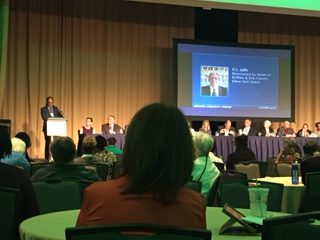
Candidates speaking at Convention
(6-29-17) The 16 candidates seeking election to the Board of Directors of the National Alliance on Mental Illness spoke with passion and civility yesterday during the opening day of the group’s national convention being held in Washington D.C.
As anticipated, many of the candidates seeking election to five open seats spoke about whether NAMI should continue broadening its focus beyond schizophrenia, bipolar disorder, and persistent and debilitating depression, traditionally identified as serious mental illnesses.
That issue has dominated this year’s election largely because of four candidates who announced they were campaigning on what they called a “Focus on Serious Mental Illness” platform. Their claims that NAMI is straying from its founders’ original mission prompted Board President Steve Pitman to write a letter before the election endorsing a “big tent” versus a “small tent” approach for the organization, which bills itself as the largest grassroots mental health nonprofit in the nation.
Veteran board member Janet M. Edelman did an excellent job moderating the hour-and-a-half session, giving each candidate five minutes to speak to a crowd of about three hundred. The candidates spoke in the order their candidate applications were submitted, which lead to three of the four candidates on the SMI platform being able to outline their positions early in the session, beginning with Dr. Robert S. Laitman, Laura Rettagliata, and D.J. Jaffe. Along with Mary Zdanowicz, they talked about how NAMI had been established by mothers of severely ill children (mostly schizophrenia) and argued that NAMI has strayed too far from its original roots. Rettagliata said NAMI needs to acknowledge that not everyone can recover and called on NAMI to focus more of its advocacy on demanding more crisis care beds and ending the inappropriate incarceration of persons with mental illnesses. For the most sick, Zdanowicz added, “hope is not enough.”
Two current board members, Adrienne Kennedy and Jim Hayes, along with Micah Pearson and Amanda Lipp, were among several candidates who spoke passionately in favor of NAMI embracing a much larger umbrella. Hayes said someone who is having their life impaired by anxiety is just as worthy of help as an individual with an SMI. He recalled how a NAMI Ending the Silence program presenter was credited with saving the life of a teenage planning suicide in his South Carolina community. It is one of the educational programs that NAMI has developed that goes beyond its traditional SMI role. Before the speeches, Hayes reminded me that Tipper Gore, former Second Lady of the U.S., had been so impressed with the Ending the Silence program (aimed at educating teens) that she had recently announced a $1 million gift to NAMI. Candidates Pearson and Lipp gave poignant speeches about their personal struggles and successful recoveries that fell outside the traditional SMI margins.
All of the candidate’s speeches were worth hearing and persuasive, giving members a wide range of worthy candidates.
Voting will take place Friday by members who have been designated by their affiliates to cast ballots. Results will be announced Saturday.
After the speeches, Jaffe, who has been the most outspoken critic of NAMI’s current practices, said the election process needs to be changed regardless of the outcome.
He said communication between candidates and members was limited because the NAMI board provides candidates with specific, uniform questions that must be strictly adhered to for distribution to members. “This tends to perpetuate what the board wants discussed, rather than opening it up to new ideas by allowing candidates to discuss what they want.”
He further complained that NAMI’s “no-campaigning rule” keeps candidates from being able to communicate directly with members before their speeches at the convention. Many affiliates discuss candidates and tell their delegates how to vote weeks before the convention.
Finally, Jaffe said, “The final vote counts are not made public, even to the candidates. So candidates don’t know if they have a huge mandate, it was a close election, or they got beat handedly. It is important to know that so the board can follow the will of the voters. It is the right of voters to know. I don’t think these rules are nefarious. But they do prevent debate on issues the board doesn’t want debated, perpetuate the board, and prevent affiliates from understanding the issues or the diversity of candidates.”



